Health ministry chides medical professors for moving to resign in support of junior doctors' walkout
By YonhapPublished : March 19, 2024 - 13:35

The health ministry on Tuesday criticized medical professors of Seoul National University for deciding to resign en masse in support of a monthlong walkout by trainee doctors, saying such a move is unacceptable.
Second Vice Health Minister Park Min-soo also stepped up an appeal for medical professors to persuade junior doctors to return to work, as their labor action has disrupted public health services.
Park made the remarks a day after the university's medical professors decided to submit resignations next week. Senior doctors from other medical schools have also threatened to quit, although they vowed to remain at work.
"The people are finding it difficult to understand and are even expressing anger toward medical professors, who have been respected as leaders of society, as they seek to make the government kneel to advance their agenda," Park told reporters.
"The people will expect medical professors to have their students return to hospitals instead of irresponsibly abandoning patients," Park said.
About 90 percent of 13,000 interns and resident doctors have stayed off the job since late February in protest of the government's decision to increase enrollment at medical schools by 2,000 spots from the current 3,058.
"The government is committed to engaging in dialogue more proactively. The channel for communication is always open, and we will listen attentively, reflecting opinions in our policies," Park added.
South Korea has been pushing to sharply raise the number of medical students to brace for the country's fast-aging population, and a shortage of physicians in rural areas and essential areas, such as pediatrics and emergency departments.
Doctors, on the other hand, say the quota hikes will undermine the quality of medical education and result in higher medical costs for patients. They have called for measures to first address the underpaid specialists and improve legal protection against excessive medical malpractice lawsuits. (Yonhap)








![[Hello India] Hyundai Motor vows to boost 'clean mobility' in India](http://res.heraldm.com/phpwas/restmb_idxmake.php?idx=644&simg=/content/image/2024/04/25/20240425050672_0.jpg&u=)











